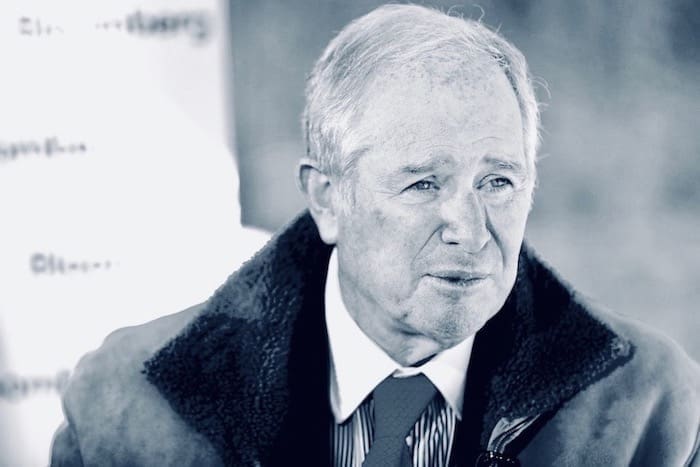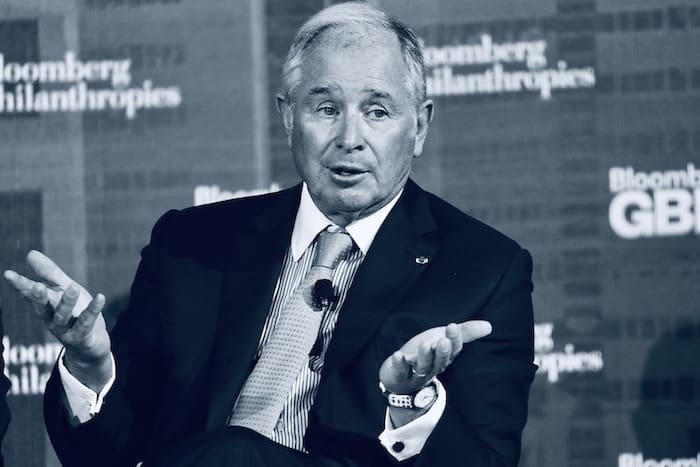Housing Is A Human Right presents another special report about the power players responsible for the housing affordability crisis. For this investigation, we examine Blackstone Group CEO and billionaire Stephen Schwarzman, one of the largest corporate landlords in the world. This report was updated on October 30, 2020.
Part I: Corporate Predator
On March 22, 2019, Leilani Farha, the United Nations special rapporteur on the Right to Housing, and Surya Deva, the chair-rapporteur of the United Nations Working Group on human rights and transnational corporations, sent a stern, seven-paged letter to Blackstone Group CEO Stephen Schwarzman. One of the richest men on the planet, Schwarzman parties with starlets, advises Donald Trump, and lives in multi-million-dollar mansions all over the world. He’s not used to getting reprimanded, but that’s what was coming.
Farha, who’s investigated housing and homeless crises around the globe, and Deva, a respected law school professor in Hong Kong, have a deep, probing knowledge of housing, human rights, and the devastation caused by the runaway greed of multinational corporations. For them, Schwarzman and Blackstone, one of the largest corporate landlords in the world, were key players in the global housing affordability crisis, which threatens the health and lives of hundreds of millions of men, women, and children. Schwarzman and Blackstone needed to be held accountable.
“We would like to share with you,” they wrote to Schwarzman, “our concern over recent structural developments that the Blackstone Group L.P. (Blackstone) helped to instigate whereby unprecedented amounts of global capital are being invested in housing as security for financial instruments and traded on global markets, which is having devastating consequences for people. We are referring to the ‘financialization of housing’ and the dominant role you play in financial markets through residential real estate.”
Farha and Deva laid out three disturbing points: 1) since the 2008 global financial crisis, Blackstone, through its subsidiary, Invitation Homes, purchased an “extraordinary and unprecedented number of foreclosed single-family properties,” which turned into rentals and “had deleterious effects on the enjoyment of the right to housing;” 2) Blackstone and its subsidiaries purchased apartment buildings at “unprecedented rates across the world, which is also having deleterious effects on the right to housing;” and 3) “Blackstone is using its significant resources and political leverage to undermine domestic laws and policies that would in fact improve access to adequate housing consistent with international human rights law.”
In fact, Reuters recently found that Schwarzman is Wall Street’s largest political contributor in the United States, shelling out more than $27 million to campaign committees, Donald Trump, and other politicians. The billionaire is clearly attempting to shape American politics and policymaking to his favor. Schwarzman has already contributed $4.4 million to Trump’s campaign or political committees connected to Trump, according to Federal Election Commission filings.
The UN experts didn’t stop with those three points. They laid out a long list of Schwarzman and Blackstone’s sins:
- Pressed to make big profits, Invitation Homes and other corporate landlords push “undue rent increases making housing unaffordable for many existing tenants and reducing the availability of affordable housing stock” in the United States.
- Invitation Homes “is quick to threaten eviction or file eviction notices to late payment of rent or late payment of fees, no matter the circumstances.”
- Invitation Homes tenants “indicated that they feel insecure living in these conditions, where above average rent increases, exorbitant fees, or the smallest infraction can result in arrears and lead to eviction and the threat of homelessness.”
- Blackstone and its subsidiaries focus on purchasing apartment buildings in “undervalued” neighborhoods, which often means properties in working-class communities. The corporate landlord then refurbishes the buildings and increases rents (“often exorbitantly”), “driving existing tenants out, and replacing them with higher income tenants.”
- Blackstone “used its considerable resources and political leverage to influence housing policy in a manner that is inconsistent with the right to housing,” noting that the corporate landlord had shelled out, in 2018, “at least $6.2 million” to defeat California’s Proposition 10. The ballot measure would have repealed a state law that places severe restrictions on local rent control policies.
- Farha and Deva concluded that “Blackstone’s and its subsidiaries’ business model is pushing low-income, and increasingly middle-income, people from their homes. Blackstone’s practices… have abruptly increased the rental payments of single-family rentals, making them unaffordable for millions of existing residents, decreased the availability and affordability of social housing, and has undertook aggressive evictions to protect rental income streams to satisfy investors.”
The letter was damning, and grabbed headlines around the world. The Guardian, based in London, proclaimed: “UN Accuses Blackstone Group of Contributing to Global Housing Crisis.” CBS News blared: “UN Blasts Blackstone Group for Worsening the U.S. Housing Crisis.” One can only imagine how Schwarzman, a ruthless businessman who once told The Wall Street Journal that he wants to “inflict pain” on and “kill off” his rivals, reacted. But housing justice activists, who work on the frontlines of the housing affordability crisis, have been making similar charges for years.
The Alliance of Californians for Community Empowerment and The Center for Popular Democracy noted in a 2019 report: “Through vulturous practices and the exertion of political influence through campaign contributions and political spending, Blackstone’s Invitation Homes and Equity Residential, like other private equity and Wall Street landlords, profit from and exacerbate California’s housing crisis, pushing more people into housing instability.”
In 2020, the Action Center on Race & the Economy also cited Blackstone’s disastrous impact on renters: “Well before the COVID-19 crisis hit, many American households, especially households of color, were spending huge proportions of their income on housing, leaving little left over for other necessities, and nothing for savings… Many cities were already experiencing housing affordability crises, with renters and owners struggling to pay rents and mortgages and homelessness skyrocketing, while corporate landlords and lenders prospered.”
Even students and faculty at two of the most prestigious institutions in the world — the Massachusetts Institute of Technology and University of Oxford — slammed Schwarzman and Blackstone.
“Concerns about Schwarzman are far ranging,” the MIT contingent wrote, “from being an advisor to Donald Trump to heading the Blackstone Group that spent millions opposing an affordable housing ballot measure in California.”
The letter continued, “Last spring, Schwarzman hosted the Saudi Crown Prince Mohammed bin Salman (MBS) — a war criminal in charge of a repressive monarchy — after Blackstone received a $20 billion investment from his government… Schwarzman’s alliance with the Saudi crown prince represents an agenda of profit at any cost, a far cry from the pious statements about ‘ethics” pronounced in public.”
Schwarzman, who ranks 66th on the Bloomberg Billionaire Index and is worth $14.4 billion, tries to evade these criticisms by promoting himself as a humanitarian. He is anything but. The billionaire’s story encapsulates the pervasive corporate greed that’s fueling gentrification, sky-rocketing rents, and homelessness in California and beyond.
And Blackstone has jumped into the battle over California’s Proposition 21, the ballot measure that puts limits on sky-high, unfair rent increases. Blackstone and Schwarzman want to stop the initiative. But rather than contribute millions directly to No on Prop 21, Blackstone is sneakily using a shell committee to funnel campaign cash to No on 21 — and to avoid the media spotlight and more public scrutiny. It didn’t work, of course, and the stealth maneuver only underscores Blackstone’s shady business practices.
It’s why housing activists, in California and around the world, are determined to rein in Schwarzman and corporate landlords. These modern-day robber barons will do anything to protect, and grow, their billions — no matter the human cost.

Part II: The Birth of a Billionaire
Born in 1947, in Philadelphia, Stephen Schwarzman grew up, he writes in the book What It Takes, “absorbing the values of 1950s America: integrity, straightforwardness, and hard work.” He graduated, in 1969, from Yale University, where he was a member of the exclusive Skull and Bones society. He received a Master of Business Administration degree from Harvard University in 1972. He worked up the ranks at the investment bank Lehman Brothers, and then co-founded Blackstone Group, a private equity firm, in 1985. In 2007, Blackstone went public, to much hoopla.
“The opening was treated almost like a Hollywood premiere at the New York Stock Exchange,” the New York Times reported in 2007, “where television trucks from networks around the world lined up to report the offering, the biggest on Wall Street and the most-high profile since Google went public in 2004.”
Blackstone initially focused on mergers and acquisitions, but with widespread foreclosures of single-family homes during the 2008 financial crisis, the company delved into real estate. It eventually gobbled up, through its subsidiary Invitation Homes, around 80,0000 homes in 17 markets in the United States, renting them out. Blackstone became one of the largest landlords of single-family homes in the country.
Blackstone also bought apartment buildings, including Stuyvesant Town-Peter Cooper Village, the gigantic, affordable housing complex in New York City that provides more than 11,000 lower- and middle-income units to some 30,000 tenants. By 2019, Blackstone owned a global real estate portfolio worth $324 billion, including 296,000 apartments and homes.
Stephen Schwarzman was riding high. Because of his growing wealth, he became a prominent figure in New York high society, donating $100 million to the New York Public Library (the library’s iconic main building on Fifth Avenue was renamed after Schwarzman) and sitting on the boards of the New York City Ballet, the New York Public Library, and the Frick Collection. The New Yorker even ran a lengthy profile about Schwarzman — a sure sign that he had arrived.
“Although he has gained weight,” wrote James Stewart, in 2008, for The New Yorker, “and his dark hair is now streaked with gray, he has the same dark eyes, and he exudes a restless intensity and an enthusiasm that belies his age. Before we sat down, he showed me around his office, an ample corner space, but modest by the standards of chief executives. Half of his desk is crowded with family photographs. Behind his chair, along the windows facing Park Avenue, are scores of photographs of him with prominent people, including President Bush and Laura Bush, the German Chancellor Angela Merkel, Cardinal Egan, Michael Bloomberg, Colin Powell, President Hu Jintao of China, Bruce Wasserstein, and the 2006 honorees at the Kennedy Center—Andrew Lloyd Webber, Zubin Mehta, Dolly Parton, Smokey Robinson, and Steven Spielberg.”
Schwarzman was not only mingling with celebrities and New York’s high society, but also with world leaders — because of his close relationship with China President Xi Jinping, the media deemed Schwarzman the “China whisperer.” He had become incredibly powerful and influential, and close with President Donald Trump, whose inaugural committee hauled in a sizable $250,000 contribution from Schwarzman.
“Schwarzman has emerged as one of Trump’s most generous donors,” the Washington Post reported in 2018, “as well as a key advisor with rare and regular access to the president.”
By 2020, Schwarzman had shelled out a total of $4.4 million to Trump’s re-election campaign and political committees aligned with Trump, according to Federal Election Commission filings.
Schwarzman also took good care of Trump’s son-in-law, Jared Kushner — Blackstone delivered more than $400 million to Kushner’s problematic real estate projects.
And Schwarzman spent grandly on himself.
Schwarzman’s billions bankrolled swanky parties for the rich and famous, including an “epic” 70th birthday bash in Palm Beach. Reportedly costing as much as $20 million, the extravagant blow out featured entertainment by superstar Gwen Stefani and the Jersey Boys cast and was attended by Donatella Versace, art dealer Larry Gagosian, and Jared Kushner and Ivanka Trump, among other luminaries. “Steve loves parties,” Gagosian told Bloomberg.
Schwarzman also laid out millions for opulent mansions in Saint-Tropez, Jamaica, East Hampton, and Palm Beach, where he spends winter weekends near his neighbor and friend, Donald Trump.
Unsurprisingly, Trump’s close advisor was no fan of President Barack Obama, who threatened to put a dent in Schwarzman’s luxurious lifestyle. In 2010, the billionaire compared Obama’s proposal to increase taxes on private equity firms to Nazism. “It’s a war,” he said, shocking many. “It’s like when Hitler invaded Poland in 1939.”
Schwarzman later apologized for that bizarre remark, but the incident showed he was willing to fight anyone, and do anything, to keep his billions. His insatiable appetite for money would not only harm others, but would stir up controversy after controversy. In many parts of the world, Stephen Schwarzman would become public enemy number one.

Part III: A Modern-Day Robber Baron
In 2018, Stephen Schwarzman brought his killer instincts to California, where a statewide coalition of more than 525 organizations, labor unions, and civic and elected leaders, including the Sierra Club, the ACLU, the National Urban League, the California Labor Federation, the California Teachers Association, AIDS Healthcare Foundation, and U.S. Senator Bernie Sanders, backed Proposition 10. The ballot measure sought to repeal a state law that placed severe restrictions on local rent control policies. Schwarzman decided to take them all on.
At a time when California’s housing affordability and homeless crises were only intensifying, Prop 10 would have brought urgent relief to seniors on fixed incomes and working-class families who faced the prospect of the homelessness. But if voters passed the measure, it would have also harnessed Blackstone’s ability to charge sky-high rents — and collect oversized profits. Through Blackstone and Invitation Homes, Schwarzman shelled out $7.4 million to stop Prop 10, which helped fund a massive, statewide TV ad campaign that sought to confuse and scare voters. It worked. Prop 10 lost at the polls — and rents continued to climb in California cities. It was a major win for the billionaire, but his troubles were not going away.
That same year, Invitation Homes (and Blackstone) came under fire when a special investigation by Reuters revealed the serious mistreatment of its tenants. The findings were similar to those of UN experts Leilani Farha and Surya Deva.
“Invitation Homes pitches itself as a singular landlord providing unprecedented ease and comfort for renters of its tens of thousands of single-family homes,” Reuters reported. “But in interviews with scores of the company’s tenants in neighborhoods across the United States, the picture that emerges isn’t as much one of exceptional service as it is one of leaky pipes, vermin, toxic mold, nonfunctioning appliances and months-long waits for repairs.”
Reuters added, “Tenants also complain about excessive rent increases and fees that can add up to hundreds of dollars a year. In a proposed class-action lawsuit filed in May in the U.S. District Court for Northern California, renters accuse the company of ‘fee-stacking.’ They allege that Invitation Homes charges tenants $95 if their rent is one minute late – even if the late payment is due to the company’s own nonfunctioning online payment portal – and then files an eviction notice to add more fees, penalties, and legal costs if the tenant wants to stay in the home.”
Also in 2018, under the watch of Schwarzman, Wells Fargo released a high-profile study about gender inequity on the boards of real estate investment trusts (REITs). Invitation Homes’ record was abysmal. From 2016 through 2018, the company’s board was composed of only nine percent women — top-rated REITs have boards of 40 to 38 percent. Invitation Homes ranked the third worst of 165 REITs studied.
Only more controversy followed Stephen Schwarzman and Blackstone.
In March 2019, a few weeks after Bloomberg revealed that the billionaire hauled in a whopping $567.8 million in compensation for 2018, United Nations experts Leilani Farha and Surya Deva sent letters to Schwarzman and several governments, igniting a media firestorm about Blackstone’s role in the global housing affordability crisis. So far, every country but the United States, led by the Trump administration, responded to Farha and Deva’s communications.
Things got worse from there.
Journalist Aaron Glantz took aim at Blackstone and other Wall Street power players with his book Homewreckers, charging that their “greed” had “decimated millions and enriched a gluttonous few.” Which led California housing activists Paulina Gonzalez-Brito and Sharon Kinlaw to describe Stephen Schwarzman and his ilk as “modern robber barons” who are “preying upon all of us.”
In the summer of 2019, New York state legislators reformed, and strengthened, tenant protections. As a response, Blackstone halted major capital improvements at New York’s Stuyvesant Town and kept rent-regulated apartments vacant. Tenants and city officials were outraged. Blackstone eventually backed off.
Throughout 2019, on the presidential campaign trail, U.S. Senator Elizabeth Warren repeatedly criticized Blackstone for allegedly financing the destruction of the Amazon and worsening climate change, and for “shamelessly” profiting from the 2008 financial crisis.
“Some of the same Wall Street firms that tanked the dream of home ownership for millions of American families are now the country’s biggest landlords — profiting off the destruction they caused,” Warren wrote in a Medium post.
Then in September 2019, faculty and students at the University of Oxford slammed the billionaire, protesting his multi-million-dollar contribution to the world-renowned school and hitting upon a public relations motive behind the king-sized outlays to elite colleges. “The ‘Schwarzman Centre’ will be built with the proceeds of the exploitation and disenfranchisement of vulnerable people across the world,” they wrote. “It is through association with universities like MIT, Yale, and now Oxford, that Schwarzman seeks to legitimise these practices.”
By October, Stephen Schwarzman appeared fed up with the criticisms, according to the Wall Street Journal. In an unusual move for a quarterly earnings call, the billionaire took time to defend Blackstone’s record, saying he was “incredibly proud.”
But a few days later, Denmark Housing Minister Kaare Dybvad chimed in. Denmark was one of the countries that UN experts Farha and Deva contacted.
“I think Blackstone has seen an opportunity to push people out of their homes to get fast returns,” Dybvad said in an interview. “We have not been used to that approach. It challenges our culture of trust.”
According to Denmark’s state broadcaster, Bloomberg reported, “there are examples in which rents jumped as much as 400% after Blackstone took over a property.”
To finish off the year, in December 2019, Denmark rolled out an anti-real estate speculation plan, including a moratorium on rent hikes. It was specifically targeted to stop Blackstone’s get-rich-quick scheme. Schwarzman, though, still hauled in big bucks for the year: more than $500 million in compensation.
In the meantime, the global housing affordability crisis was still worsening. In the U.S., according to a Harvard study, some 21 million tenants were cost-burdened, spending more than one-third of their income on rent. Whitney Airgood-Obrycki, the study’s lead author, told The Christian Science Monitor: “This is like nothing that we’ve seen.”
But that wasn’t necessarily true. In 2020, because of the financial devastation caused by the COVID-19 pandemic, rent had become unaffordable in every state in the nation, according to a report by the National Low Income Housing Coalition. And 12.3 million Americans who can’t afford sky-high, unfair rents are at high risk of getting evicted, which could trigger a catastrophic homelessness crisis. Understanding Schwarzman’s role in all this misery, hundreds of protesters marched on his palatial estate in The Hamptons. No one was sure if the billionaire was home — or if he was riding out the pandemic in one of his other multi-million-dollar mansions.
“Billionaires are experts in social distancing,” Alicé Nascimento, director of policy and research for New York Communities for Change, told The New York Post. “They’ve chosen to live in their own world and are separate from realities of everyday people and the people whose lives they have a tremendous impact on.”
As the pandemic continued to rage, Schwarzman and Blackstone aimed their sights on California’s Proposition 21, the statewide ballot measure that allows communities to put limits on sky-rocketing rent increases. Quietly, Blackstone delivered $7 million to the California Business Roundtable Issues PAC in June 2020. The Issues PAC then funneled big bucks to No on Prop 21: Californians to Protect Affordable Housing, totaling $7,250,000 million by October 30.
Just like with California’s Prop 10 in 2018, Schwarzman and Blackstone are using their tremendous power and wealth to undermine policies that would improve access to affordable housing.

Part IV: Reining In Schwarzman
It’s been six decades since billionaire Stephen Schwarzman grew up in America’s 1950s, when he claims he absorbed the values of integrity, straightforwardness, and hard work. His track record suggests that “integrity” never really stuck.
According to activists, critics, and United Nations experts, Schwarzman has made mountains of cash by manipulating tenants and rental markets, buying off politicians, fooling voters, fueling a global housing affordability crisis, profiting off the 2008 financial crisis, instituting excessive rents increases and aggressive evictions, and the list goes on. Schwarzman, in other words, has amassed a fortune off the misery of others, most of whom are middle- and working-class Americans. There’s not much integrity in that.
California activists have seen more underhandedness from Schwarzman with Blackstone using a shell committee to contribute to the No on Prop 21 campaign. Yet with the COVID-19 pandemic slamming millions of renters, housing activists say Prop 21 is needed now more than ever.
A growing grassroots movement, including U.S. Senator Bernie Sanders, ACCE Action, Brown Beret National Organization, labor icon Dolores Huerta, Congresswoman Maxine Waters, Eviction Defense Network, AIDS Healthcare Foundation, UNITE HERE Local 11, San Diego Tenants United, and many others, has rallied behind Prop 21. The initiative allows California communities to put limits on unfair rents and rein in the greed of Stephen Schwarzman and other corporate landlords. Prop 21, activists say, finally puts people over profit.
Patrick Range McDonald is the award-winning advocacy journalist for Housing Is A Human Right.

